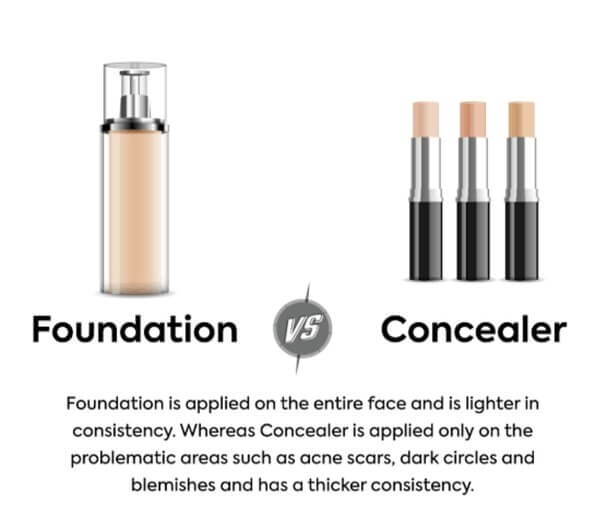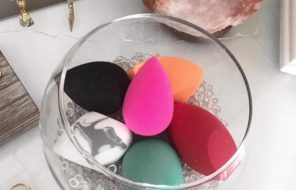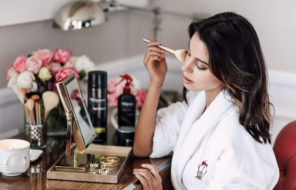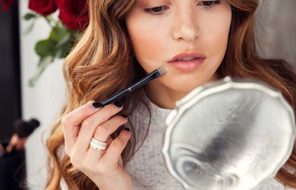When it comes to complexion makeup, the two products you’re most likely to envision are foundation and concealer. Concealer became prominent in the mid-2010s, thanks to the rise of contouring. These days, concealer feels like a main event, leaving many people feeling like they haven’t adequately applied makeup if they haven’t incorporated a layer (or two or three!) of concealer.
In some cases, people opt for concealer-only makeup applications over traditional foundations. If you’re feeling a bit overwhelmed trying to determine whether you should pick a foundation, concealer, or both for your makeup routine, you’re not alone. This deep dive into these two essential complexion makeup products will help you determine when to use one over the other or combine them.
Foundation defined
As the name implies, the best foundations act as the base for your makeup applications. The core purpose of foundation is to even out your skin tone, minimize blemishes, mask imperfections, and create a somewhat uniform appearance to your skin.
Foundation can be found in a variety of finishes and coverage levels. Common finishes include satin, matte, and dewy, while coverage usually includes sheer, medium, and full. Although you can choose to leverage a spot application method (applying foundation only where you think you need it), the tried-and-true method is to apply it to your entire face (and possibly your neck for an undetectable finish).
Concealer defined
Concealer is intended to be a spot application makeup product. In most cases, it’s used to minimize the appearance of blemishes, reverse the look of hyperpigmentation, and disguise discoloration in specific areas (like under the eyes). Concealer is usually divided into two major subcategories: color correctors and skin perfectors.
Color correctors are typically applied before you apply foundation and work to minimize the appearance of hyperpigmentation, dark undereye circles, or other pigmented blemishes that would otherwise show through your foundation. Meanwhile, traditional concealers are usually applied after foundation and are meant to brighten (such as with undereye placement) and minimize the appearance of shadow or texture.
What’s the difference between concealer and foundation?

Historically, concealer had a thicker formula than foundation because it was meant to mask solely imperfections. However, full-coverage foundation can sometimes mimic traditional concealers, given that this coverage level offers the thickest formula. In theory, if you pick the right colors, you could use a full-coverage foundation as a concealer.
However, these days there are many concealers designed with budge-proof formulas, making them particularly ideal for areas prone to product shifting, like under your eyes.
Should I use concealer?
If you’re genetically blessed with blemish-free skin that doesn’t have hyperpigmentation or undereye bags, congratulations: You don’t “need” concealer. Likewise, if you don’t need to color correct, you could technically use foundation in a shade one to two tones lighter than your natural skin tone to create a brightening undereye effect.
On the other side, those who don’t want to wear a full face of foundation might be fine using a concealer to spot-treat certain areas of your face that need attention. This results in a more natural look and leverages concealer and other makeup products (e.g., blush, eyeliner, mascara, etc.) as needed to minimize blemishes without relying on a full face of foundation.
However, if you love a full face of makeup and prefer more product-heavy techniques, like baking, contouring, or strobing, then it’s probably safer to use concealer. By default, concealer has a better budge-proof record than foundation and is less likely to shift, settle into fine lines, or otherwise highlight areas you don’t want to feature.
Which comes first: foundation or concealer?
Applying foundation or concealer first depends on why you’re using the products. If you’re using concealer to color correct, this always occurs before you apply foundation. Color correctors are usually produced in vivid hues that would otherwise be hard to blend on top of foundation. So, it’s best to apply this product first, then follow up with foundation.
If you’re simply using skin tone concealers to hide blemishes, it’s usually best to apply this after your foundation. While you’ll find people who prefer to apply concealer first, it can be tricky to master a foundation application technique that doesn’t wipe away the concealer. This is especially true when attempting more intensive techniques like contouring or baking.
Whichever order you choose, we recommend matching formulas. In other words, use a liquid concealer with a liquid foundation or a cream foundation with a cream concealer. Mixing formulas can create unwanted interactions like pilling, shifting, or creasing.
| Technique | Foundation | Concealer |
|---|---|---|
| Color-correcting | No | Yes: Apply before foundation |
| All-over face application | Yes: Apply 2nd if also color-correcting and 1st if not color-correcting | No |
| Brightening | Yes: Pick a shade 1-2 tones lighter than your main foundation and apply after primary foundation | Yes: Pick a shade 1-2 tones lighter than your foundation and apply after primary foundation |
| Contour/baking/etc. | Sometimes: Pick a budge-proof formula and apply after primary foundation | Yes: Apply after primary foundation |
Customize your makeup routine for your needs
While there are a few rules in makeup that can’t be ignored (color theory, anyone?), there’s no hard and fast rule regarding whether concealer or foundation is better for you. Ultimately, your skin type, makeup comfort level, and individual body chemistry will be more influential in determining what application techniques and products work best for your needs and lifestyle. Still, having an understanding of how these two complexion makeup products work and how they can be used alone or together can help you perfect your makeup game in the long run.





